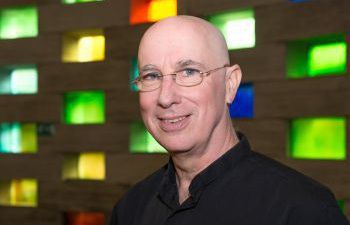‘Doing death’ makes life worth living
Posted on behalf of: Revd Chris McDermott, Lead Chaplain for the University of Sussex
Last updated: Thursday, 9 June 2022

Reverend Chris McDermott, Lead Chaplain for the University of Sussex
Please note: this article contains themes about death and dying.
‘Doing death’ is my rather inelegant phrase for allowing the dreaded subject to feature as a normal part of our lives.
Early last month, I was invited by a friend to join an online Death Café event hosted by his wife from their home in France. For anyone unfamiliar with Death Cafés, their objectives are to increase awareness of death with a view to helping people make the most of their (finite) lives. They are not counselling services, but rather supportive, safe and respectful spaces for communities to gather and discuss something which affects us all.
The event was at 10am on a Saturday morning and initially I was doubtful I’d be able to attend as I already has a speaking engagement in Shoreham at 7.30am that morning. (I won’t agree to doing that again soon!) However, I was able to join the conversation and was pleased by how uplifting it was to engage with others about a subject that is frequently regarded as taboo. It was neither morbid nor depressing.
I was familiar with the realities of death and loss from an early age. Seeing bodies at open casket funerals, and occasionally in contexts where actual fatalities occurred, losing close family members and friends, all from an early age, familiarised me with the theme of death and grief from earliest years. But, somehow none of it ever acquired a morbid aspect for me. It was a normal part of my life.
What made it normal wasn’t that it happened routinely – because it didn’t. However, our family drew on a ritual framework for dealing with such experiences and their sense of loss and angst. In my case, it was the ritual of Catholic traditions around death that supported and sustained me in times of shadow. I think that it also helped me in my own future work as a priest.
Very often in my vocation I have had the privilege of walking with others on the sacred ground of their times of loss or mortal illness. At times it has been a terrible privilege, as when I had to knock on the door of a parishioner to inform them that their son had died by his own hand. I still see the smiling face of the parent opening their door to me, mildly quizzical about my presence, in that moment before I brought the devasting news into their family home.
I often help arrange memorials for members of our own campus community that afford spaces for friends and colleagues to share their sense of loss. I see this as a very important part of my work as university chaplain.
In all of this, paradoxical as it may sound, my intent is to encourage us all to enjoy and value our lives and celebrate being alive. I suggest that life is most celebrated when we can healthily engage with our own impermanence and that impossible possibility we share: our mortality. The beauty of chiaroscuro art lay in the interplay of those extremes of light and darkness. We need to engage with the whole tapestry of light and shadow in order to appreciate the fullness of beauty in living. Normalising those conversations about death go some distance in enhancing our appreciation of life and those we love.
In the meantime, I am very pleased to see the work of Sussex alumna Louise Harman, founder of the website Louise on Death, enabling people to talk about death, along with so many others doing good work in this area. It is also good to see a group of students offering peer support for those touched by the realities of grief and death gathering at the Meeting House in recent times.
I am looking forward to participating in a ‘Death Festival Conversation’ at ACCA on 28 April – one of a series of events to take place around the country - that will include a round table conversation with academics and others that have a research or professional interest around the theme of death. Perhaps some of you will be there or even make a contribution to the day.
Finally, please know that I and my interfaith team of chaplains are available to chat with you about these – or any other issues that you may feel are sensitive, difficult or currently impacting on your lives – whatever background you come from, religious or not, student or member of staff.
We are here for you.